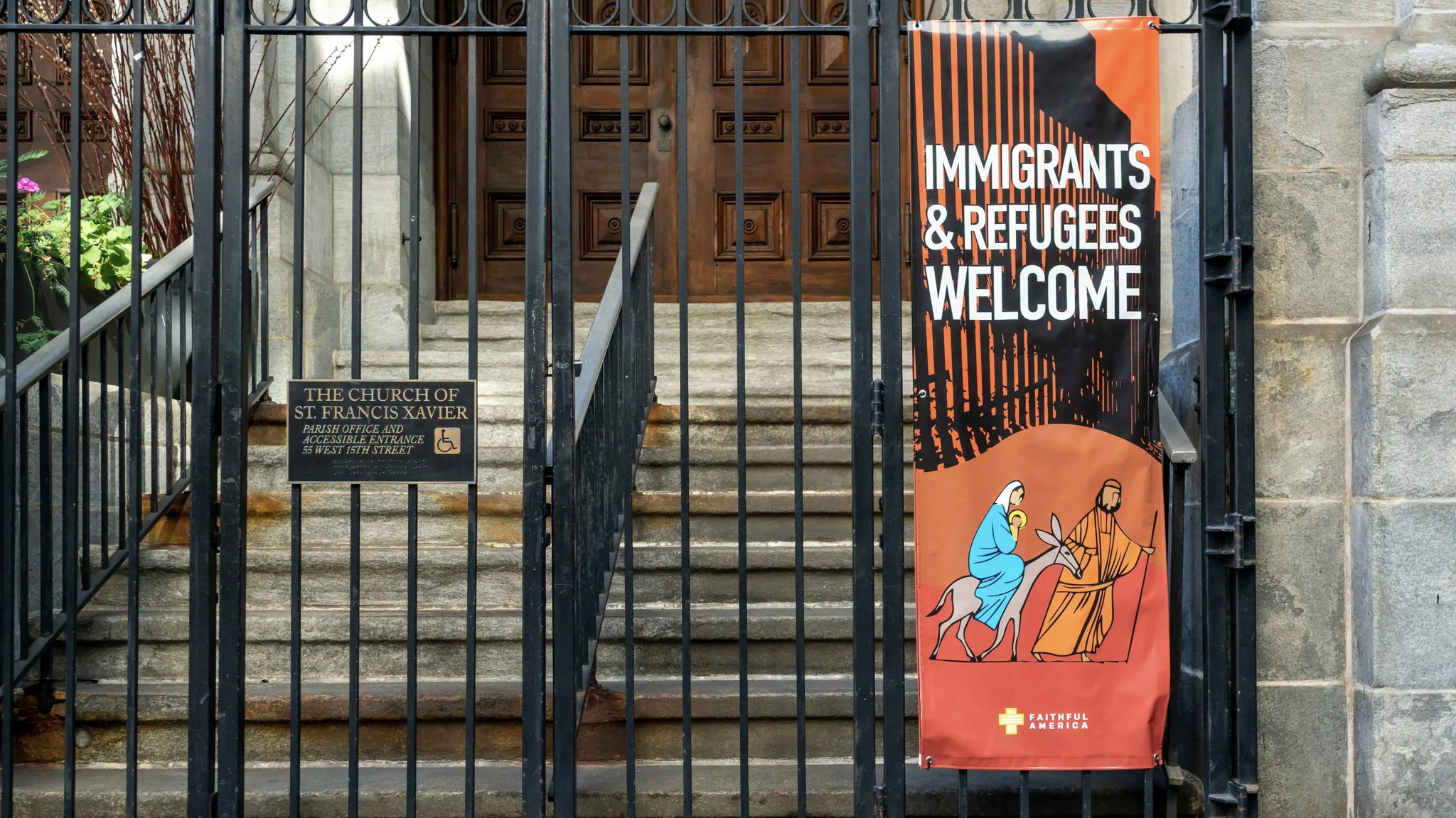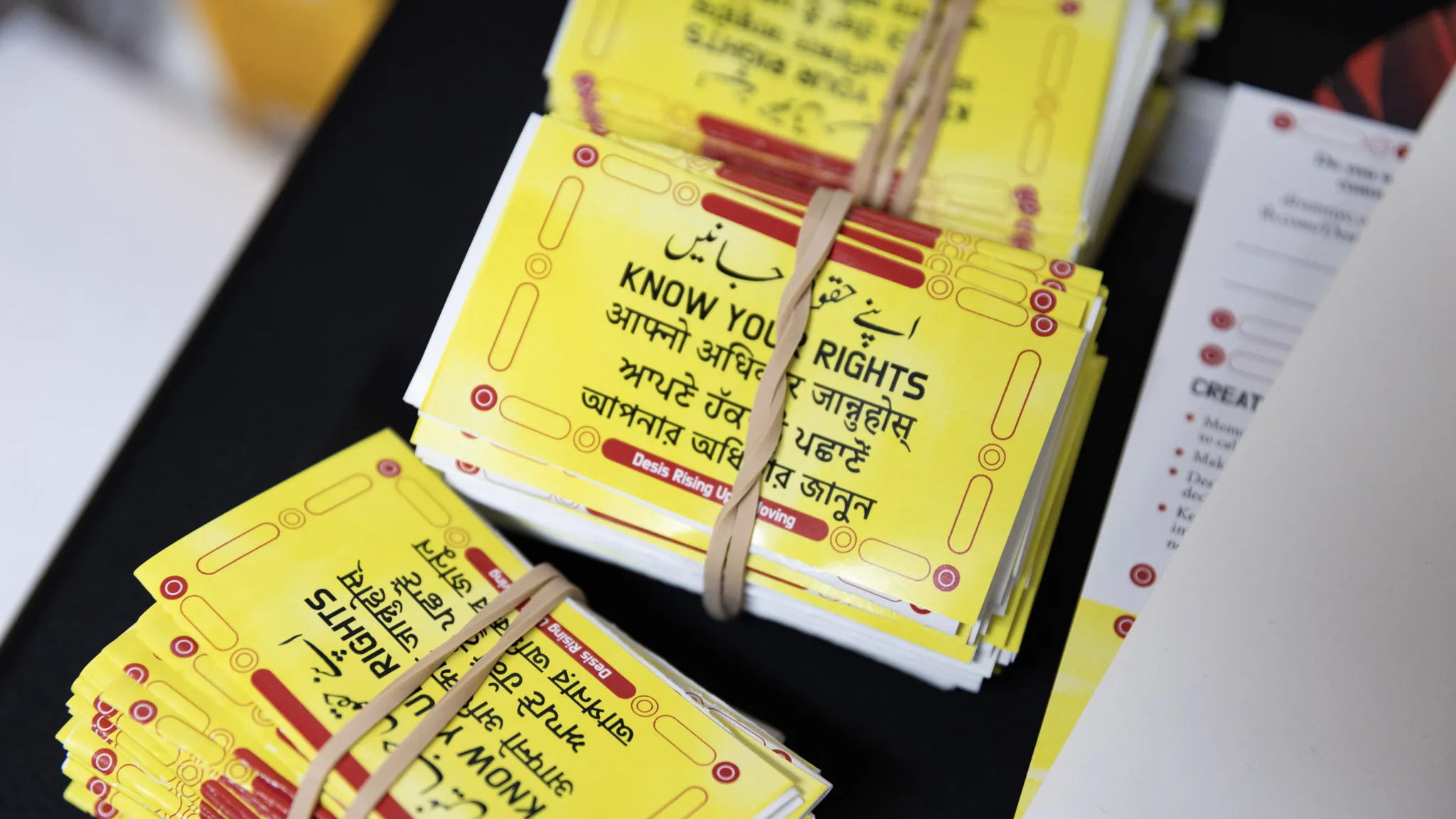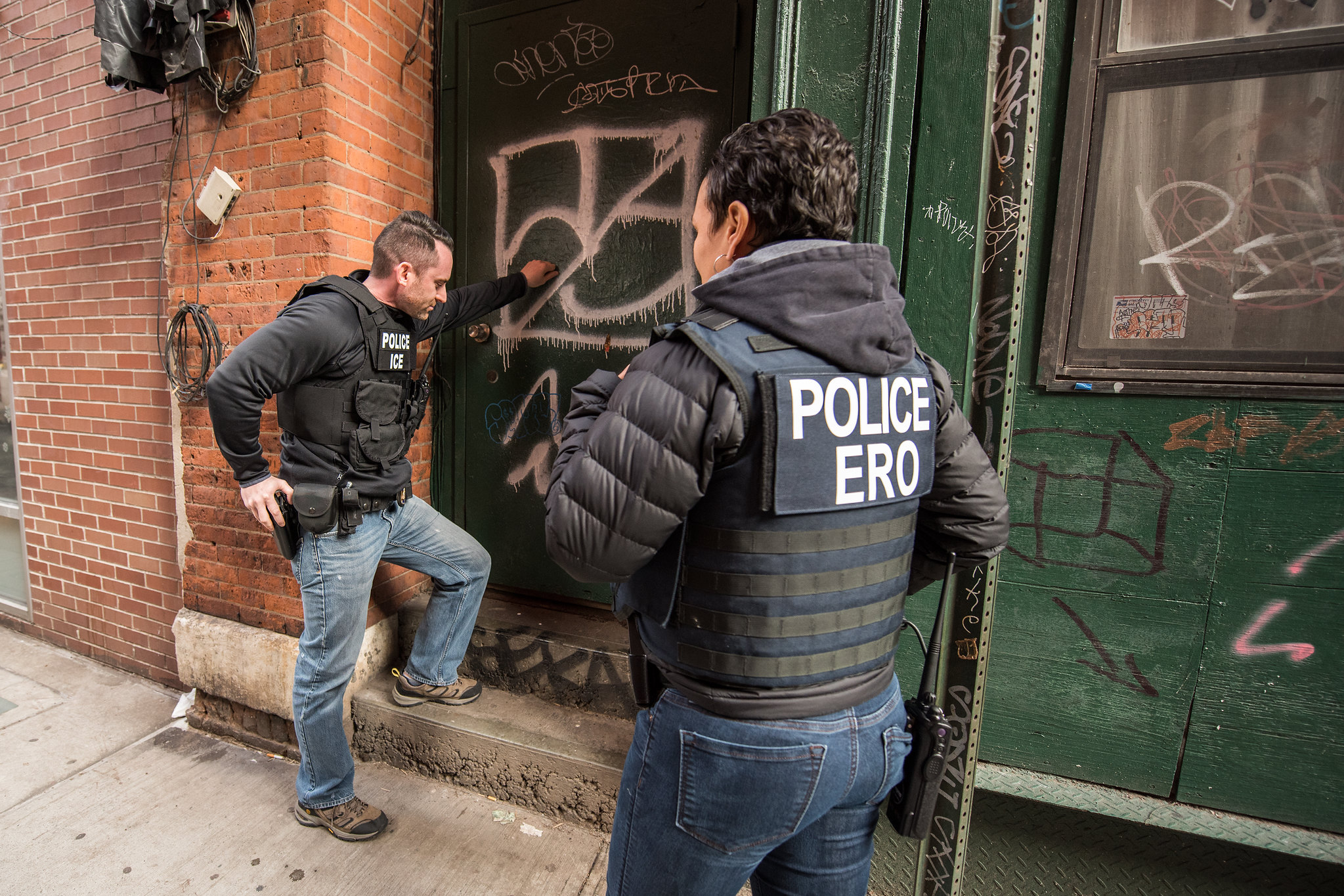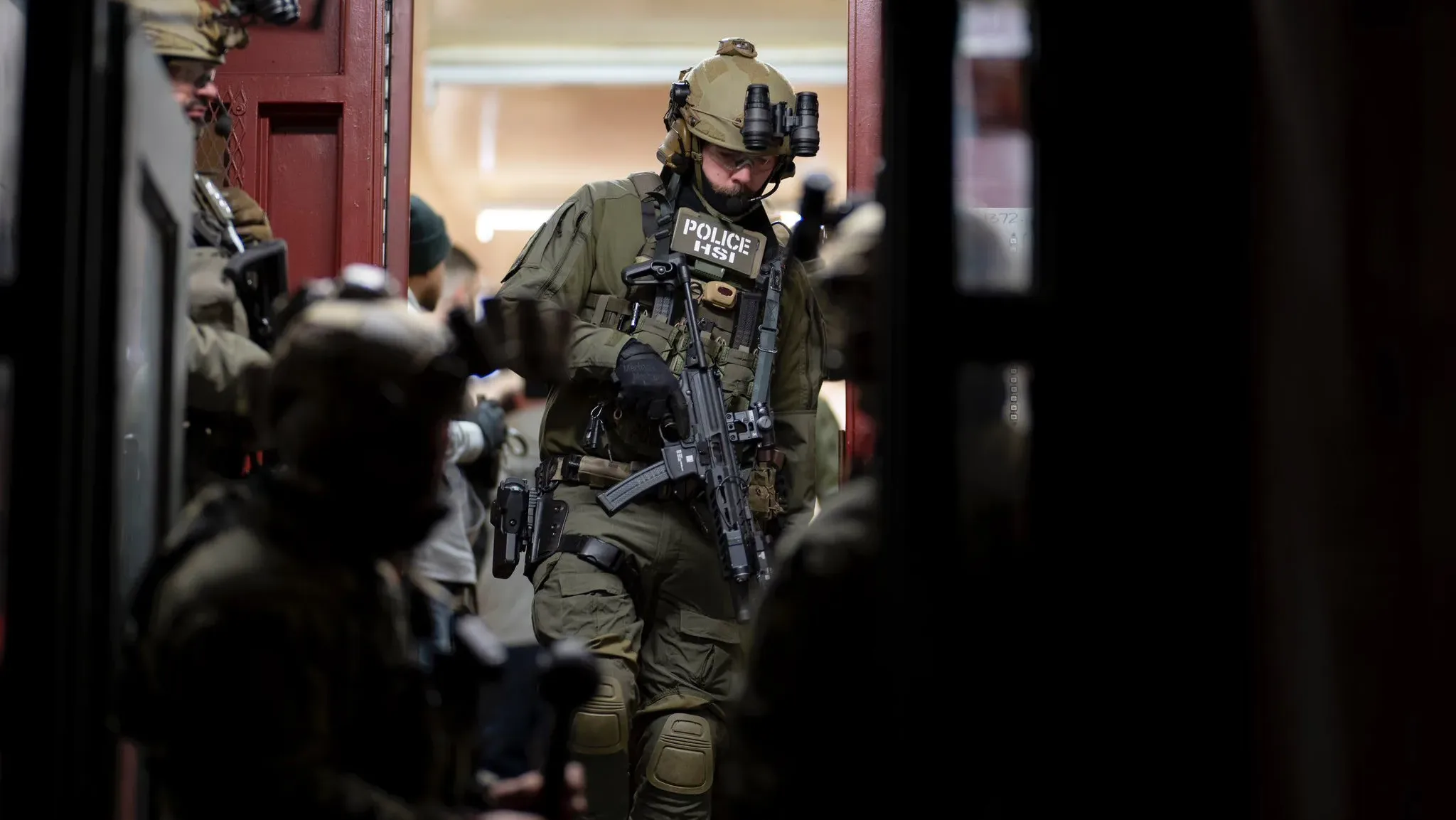Reina arrived to New York seeking a new life, one vastly different from her home country of Guatemala. She wanted to escape constant crime in her country, but also its gang violence that claimed the lives of both her father and sister. Speaking to Documented, Reina said she came to New York as a refugee a few weeks ago to rebuild her life for her and her two children.
Church World Service was helping Reina, well aware that the first 90 days of a refugee’s arrival within the U.S. is the most critical time for resettling. With their help, she received health screenings, insurance, and right before President Donald Trump’s recent suspension of refugee resettlement programs took effect, she was in the process of getting SNAP and direct assistance. Reina’s two children are both now going to school, and she said she is happy to be in a safe space.
For Reina, who chose to only share her first name out of concerns for her privacy, Church World Service played a critical role in her resettlement. But Trump’s executive order, “Realigning the United States Refugee Admissions Program,” delivered a significant setback for refugees like her. The order suspended refugee programs beginning Jan. 27, and stated that within 90 days of the suspension the administration would assess if restarting the program is in the nation’s best interest.
Recently, the head of Church World Service, Rick Santos, joined a group of refugee resettlement organizations to sue the administration for putting a halt to the immediate suspension of the refugee programs. As part of the order, two programs that assisted with the resettlement and sponsorship of refugees were suspended: the U.S. Refugee Admissions Program (USRAP) and the Welcome Corps program.
Also Read: Trump Halts Refugee Program, Seeks to Terminate Temporary Protected Status
But there have been no updates since the lawsuit was filed, says Chia-Chia Wang, the New York director of Church World Service, who noted the federal government continues to not reimburse their organization for the work that has been done since late 2024. “Together, with the illegal and ill-spirited executive order to decimate the U.S. Refugee Resettlement Program, it has not only hurt but crippled our programs and our community,” she said.
Wang said she hopes the court will bring justice, telling Documented that Trump’s orders “really wage a war” on refugees and migrants. “[These people] have been waiting in line and in refugee camps in very difficult third-country situations and have been separated from their loved ones for years,” she said. “Finally, it’s their turn to come, and that pipeline has been cut off now.”
A commitment that won’t stop
Since Trump issued his executive orders, one of the most pressing questions has been how the 90-day support period will be impacted, especially for refugees who were still in their first 90 days with resettlement groups when Trump’s order took effect.
As the chart above demonstrates, Trump’s first administration shows a pattern of unprecedentedly low ceilings on refugee resettlement compared to his predecessors. In 2008, former President George W. Bush, for example, set a cap of 80,000 refugees per year while admitting about 60,000. Former President Barack Obama set a cap of 70,000 refugees in Fiscal Year 2014 to 2015. In FY 2016, Obama raised the limit to 85,000 while admitting nearly the same number of refugees into the U.S. In comparison, Trump dramatically reduced the number of refugees that can be admitted into the U.S. to 15,000 during his first tenure in FY 2021. When Biden took office in 2021, he raised the limit to 62,500 and further doubled it to 125,000 in 2022.
Also Read: Biden Increases Historically Low Refugee Cap
Before the last executive order was announced, CWS received its last client at its New York site on Jan. 17. Like many organizations that have made a commitment to help newly arrived refugees, they are serving clients who have not yet reached their 90-day resettlement period. For CWS, that’s roughly 4,000 people, which they received between Oct. 1 and Jan. 17.
“That’s an organizational policy and commitment that we made,” said Wang. “We certainly hope that the U.S. government will pay us and also pay the clients.”
Wang is not alone. Catholic Charities of New York has about 25 clients who arrived in the first quarter of 2025. They said only one family was outside of the 90-day support period, and the remaining 24 were affected by Trump’s suspension. A representative from Catholic Charities told Documented that they’re still unsure if such families would be served. For now, the United States Conference of Catholic Bishops (USCCB) — which is the national resettlement organization for Catholic Charities NY— sent guidance to Catholic Charities of New York that they could continue essential services, but anything outside of that, they would not do, the representative said. However, they were not sure what that meant in terms of getting reimbursed from the federal government.
“We’re definitely going to do it no matter what. We have to,” the representative said. “Ethically, morally, we are responsible for folks that are in our care right now, and we would never leave someone high and dry.”
Like Catholic Charities NY, other refugee resettlement organizations in New York are also bound by the guidance they get from the national branch of their offices. If the head offices are interpreting the executive orders from the Trump administration in a more strict way, then they may be told they have to just stop all their services and there’s nothing they can do.
A double blow
In many organizations that serve refugees, not only have their clients been affected, but the staff themselves have been deeply shaken, or reduced, said Maggie Mitchell Salem, executive director of Integrated Refugee & Immigrant Services (IRIS), New Haven. “They’re not only concerned about their own status,” she said, “they’re losing valued colleagues, many of whom are also immigrants.”
The Trump administration’s executive order abruptly canceled IRIS’ contract to resettle 800 families. IRIS was set to receive $3 million this year through the State Department’s Reception and Placement Program to support refugees during the critical first 90-day period of help for refugees.
“Because we have a stop work order, we’re not turning off our computers, turning off the phones, and not, you know, letting people in,” Salem said. “We serve people. We will continue to serve people.” She noted that IRIS has been informing the communities they serve that they’ll be slower to respond, but they are still offering support.
IRIS’ direct engagement with refugees has been through several avenues, including the Welcome Corps sponsorship program, where U.S.-based residents are seeking to sponsor a refugee. The organization provided help to the U.S.-based residents who are welcoming refugee newcomers as they begin a new life in America. But many members of the sponsorship community had family members who were very close to arriving and now don’t know what to do.
Also Read: Afghans Help Each Other Start Over in Capital Region
Of the 800 families IRIS was expecting to resettle in New Haven in 2025, 210 of those families arrived between Oct. 1, 2024, and Jan. 20, 2025. IRIS still intends to support and assist those families, which is why the organization launched an emergency appeal for people to donate.
“Even before we launched the appeal, we had co-sponsor groups reaching out to us — that is, people who had settled refugees starting in 2014 across [Connecticut] state and even helped inspire the Welcome Corps program itself,” Salem said. IRIS has been renowned for its model of bringing Connecticut residents together to welcome refugees.
Beyond the refugee program, IRIS also serves humanitarian parolees, which further complicates the organization’s work. A DHS directive now requires officials to review people’s parole cases and potentially revoke their status, which would initiate deportation proceedings.
‘Feels like a few years’
Experts in immigration and refugee resettlement have criticized President Trump’s executive order for conflating different migrant groups with the U.S. Refugee Admissions Program (USRAP), despite their distinct histories and processes.
USRAP, historically backed by bipartisan support, operates as a public-private partnership involving the Department of State, national resettlement agencies (many faith-based), and state refugee coordinators. However, the executive order justifies suspending the USRAP program by linking it to record migration levels in various U.S. cities and states, citing strains on local resources.
“Cities and small towns alike, from Charleroi, Pennsylvania, and Springfield, Ohio, to Whitewater, Wisconsin, have seen significant influxes of migrants. Even major urban centers such as New York City, Chicago, and Denver have sought federal aid to manage the burden of new arrivals. Some jurisdictions, like New York and Massachusetts, have even recently declared states of emergency because of increased migration,” Trump’s executive order said.
Refugee resettlement experts emphasize that USRAP and Welcome Corps differ from other migration pathways as participants enter the U.S. with documented status. Still, they acknowledge that refugees’ lived experiences may mirror those of undocumented migrants. As a precaution, experts advise refugees to carry documents proving their legal status and arrival details.
While resettlement agencies have been affected by the Stop Work Order — a memo sent to all resettlement agencies to stop work immediately they received from the Trump administration — private sponsor groups of Americans and U.S. residents who signed up to welcome refugees are still supporting the refugees they have welcomed.
Beyza Burçak Klein, who is part of a private sponsor group in New York City and has six other people in her private sponsor group, signed up to welcome a refugee in August of 2024. They were able to welcome that person on Jan. 13, a week before Trump’s inauguration. Their commitment has not changed. “The stop work order doesn’t really apply to my sponsor group, because we’re all private citizens who are volunteering to do this work,” Burçak Klein told Documented.
Like Burçak Klein, there are many others who signed up to welcome refugees through the Welcome Corps program, who got certified, and were expecting to welcome a refugee. But with travel of refugees into the U.S. being suspended, they’re no longer able to do that.
Through the Welcome Corps, more than 150,000 individuals across all 50 states and D.C. in the U.S. signed up to become private sponsors. “A lot of those people you know weren’t able to welcome a refugee, and there’s already an interest,” Burçak Klein said. “I have hope that people will find a way to get connected with local organizations or groups to support refugees who have already arrived.”
Needless to say, the past few days have felt like an entire year to resettlement agencies who remain worried about their clients, a vulnerable population they have received within the last few months, Wang of CWS told Documented. “It’s funny, you say a few days. It feels like a few years. […] I want to say that I’m deeply, deeply sad, saddened by the various executive orders that profoundly hurt refugees and migrants,” Wang said.
M. Daad Serweri, associate director of sponsorship at IRIS, told Documented that the greatest impact from all the executive orders will be on the clients.
“We have been assisting them to put them on the path to self-sufficiency, and they are not yet,” Serweri said. He noted that some of those clients arrived just last month, and they are in English class to improve their language skills so that they can be prepared for employment. “Those clients are impacted so badly, and we are really worried about that,” Serweri said. “We are doing whatever we can to help, but our resources are very limited right now.”
As for Reina, the Guatemalan refugee, she says with all the programs being cut by Trump, she worries most about bringing her family to the U.S. She says she doesn’t miss the food or much else from Guatemala. “I don’t miss anything,” she said, “only my family.”
Correction February 20, 2025: An earlier version of this piece misstated the national resettlement organization for Catholic Charities of New York as Catholic Charities USA. The correct organization is the United States Conference of Catholic Bishops (USCCB).














